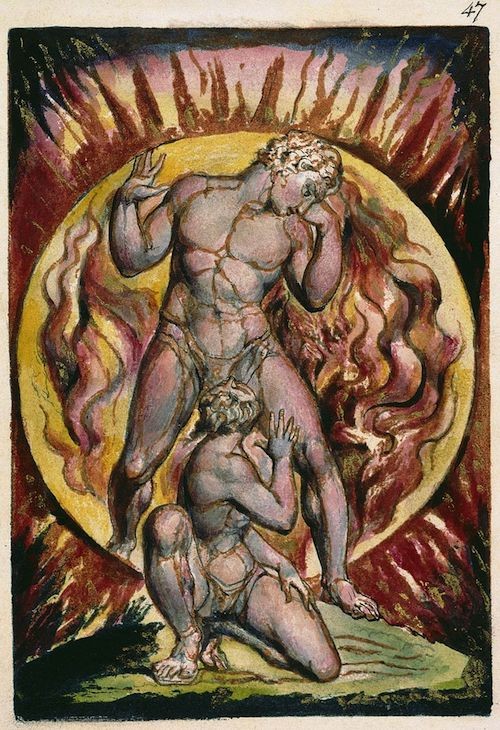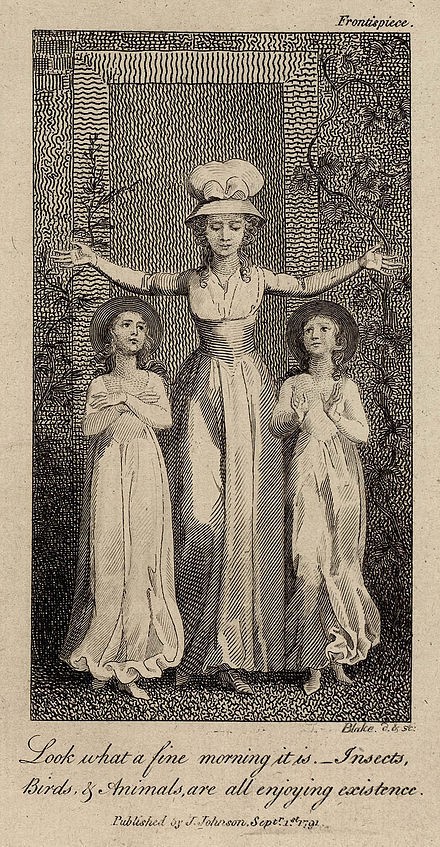'And did those feet in ancient time': William Blake’s Vision of Jerusalem
BY Vincent Katz

I can’t quite remember what brought up William Blake, or the poem known as “Jerusalem.” But suddenly, I was brought back to the Hubert Parry anthem setting of this poem. It’s ironic to me, and I can’t quite figure it out, how an anthem that King George V preferred over “God Save the King,” and that infiltrated popular culture, being adored as a sublimely patriotic song, could have arisen from a poem whose lyrics and their composer harbor distinctly non-conservative views. Perhaps that’s the genius of Blake, or Parry, or both.
Blake had a complicated relationship to religion, or spirituality, and it is that relationship that makes his work intriguing, if sometimes baffling, to contemporary readers. He created an entire alternate universe, almost like science-fiction, his own mythological world, and yet he believed in the essence, as he saw it, of Christianity.
Blake’s poem, which he did not call “Jerusalem,” comes in the preface to his epic Milton: A Poem in Two Books, composed between 1804 and 1810. First, there is a screed attacking Greek and Latin writers: “The Stolen and Perverted Writings of Homer & Ovid, of Plato and Cicero, which all Men ought to contemn, are set up by artifice against the Sublime of the Bible… Shakespeare and Milton were both cursed by the general malady & infection from the silly Greek & Latin slaves of the Sword.” He rails against hirelings in “the Camp, the Court & the University” and begs painters and sculptors not to give in to the temptation of lucre and false advertising. Then he writes something odd: “We do not want either Greek or Roman models if we are but just & true to our own Imaginations, those Worlds of Eternity in which we shall live forever in Jesus our Lord.”
In the final sentence, Blake seems to equate the human imagination with a Christian vision. Many today would argue that imagination is a personal realm, sacred to the self, inaccessible to any outside influence, whereas religion is precisely that kind of organizing system that someone like Blake should decry. But I believe Blake, for all his odd conceptions and inconsistencies, thought deeply about literature and saw in the Bible, and in the figure of Christ in particular, an antidote to the rise of the Industrial Revolution, which he saw as a terribly pernicious cancer in the society of his time.
That, to me, is the meaning of the idea of “Jerusalem” for Blake, which is what I’ve been trying to figure these last weeks, while thinking of the poem often referred to by that title, and which follows the anti-Classics rant in Blake’s preface to Milton:
And did those feet in ancient time
Walk upon Englands mountains green:
And was the holy Lamb of God,
On Englands pleasant pastures seen!
And did the Countenance Divine,
Shine forth upon our clouded hills?
And was Jerusalem builded here,
Among these dark Satanic Mills?
Bring me my Bow of burning gold:
Bring me my arrows of desire:
Bring me my Spear: O clouds unfold!
Bring me my Chariot of fire!
I will not cease from Mental Fight,
Nor shall my sword sleep in my hand:
Till we have built Jerusalem,
In Englands green & pleasant Land.
I got to know the music of Hubert Parry in a small chapel whose evensong offerings had a special quality, due to the curation of Martin Stokes, now King Edward Professor of Music at King’s College, London. Stokes would combine anthems by 16th and 17th century English composers, such as Thomas Tallis, William Byrd, Orlando Gibbons, and Henry Purcell, with 20th century offerings by such composers as Edward Elgar and Ralph Vaughan Williams. It is in this latter group that Parry belongs.
During World War I, Britain’s poet laureate, Robert Bridges, approached Parry, asking him to compose music to Blake’s poem as part of an inspirational package to boost sinking morale. It was Bridges who, in a sense, rescued this poem from relative obscurity. From the time of its composition in 1916, the song was popular; it was used by the Suffragettes in 1917 and thereafter by political parties from across the spectrum. In 1922, Elgar composed an orchestral version of Parry’s song, and this was the version King George V said he preferred to “God Save the King.” Basically, every Briton who has love for the myths of England gets moved hearing and especially singing this song setting of William Blake’s poem.
Many people have pointed out that a simplistic love of country (if that is indeed what people are feeling) would be completely at odds with Blake’s philosophy and life’s work. Blake was a critic of the Industrial Revolution and the Church, an advocate of the Free Love movement, and a forerunner of women’s rights movements. He admired Mary Wollstonecraft and illustrated a book of her writing.
There is something ancient about the sound of the music, which accords perfectly with Blake’s vision in the poem. I believe it is in the use of modal melodies, which Parry then deftly switches to tonal cadences, bringing the ancient into the contemporary, Edwardian, moment. In Parry’s version, Blake’s poem presents a vision of England as an eternal, and vernal, place. People singing the song must hear mainly the words “ancient” “Englands mountains green” “Lamb of God” “pleasant pastures seen” “Countenance Divine” “Jerusalem builded here” “Bow of burning gold” “arrows of desire” “my Spear” “my Chariot of Fire!” “I will not cease” “Till we have built Jerusalem, / in Englands green & pleasant Land”.
Parry, or maybe Bridges, or both working together, made one slight change to Blake’s poem, which has massive repercussions in its interpretation. They were shrewd to make it, and I don’t think the song would have the success it has had without it. The most striking line in the poem is undeniably “Among these dark Satanic mills”. Parry and Bridges changed “these” to “those,” instantly transporting Satan and his factories of Evil off of the blessed Isle and onto other peoples, probably Europeans.
Another thing one needs to know about the poem is the myth that Jesus once visited England, possibly with Joseph of Arimathea, who took him down from the cross. There seems to be little written record of this myth. Could it have survived for centuries as a purely oral belief? In any event, this is the idea that Blake is toying with in his poem. But Blake cleverly poses a series of questions; he remains in doubt. In the center of the poem is this incredulous question, “And was Jerusalem builded here / Among these dark Satanic mills?” “Dark Satanic mills” clearly refers to England’s burgeoning mill and factory economy, which Blake and others decried as depriving poor people of their livelihood and connection to nature and to their own production, while subjecting them to brutal hours and dangerous conditions. Some see an additional meaning in “mills” here as referencing England’s churches, which makes sense, as Blake was opposed to any kind of bondage, including through religion. Changing “these” to “those” alters the scope of “among,” putting Jerusalem here in England, while those evil mills are around about in other lands, across the Channel or Ocean.
The military imagery is another mysterious element. It allows patriots to get fired up, when they sing about their bow and arrows and spear and chariot of fire. But Blake would not have wanted the words to be read in a nationalistic, militaristic way. If anything, these words must be understood metaphorically as something akin to the Shambhala idea of “warrior in the world,” that is, Blake, and those who agree with him, will take up metaphorical arms to battle dehumanization and oppression—and to establish Jerusalem in England.
What exactly does Blake intend by “Jerusalem”? Again, in various writings, including his epic poem Jerusalem, he works around the issue, reluctant to state his belief in definitive terms. I understand that by “Jerusalem” Blake intends another metaphor, this time to stand for an ideal world of love and mutual respect, as evidenced in the most literal interpretation, in Blake’s eyes, of the teachings of Jesus, perhaps even taking them out of the context of the Bible and the clutches of church elders through the centuries. In essence, Blake is calling for an anarchist world, free from oppressive contracts, including marriage. That is what he would see flourishing “In Englands green & pleasant Land.”
What amazes me still is the transformation—how Parry, at Bridges’s instigation, could have taken this hitherto largely unremarked poem and, with one important shift, turned it into a national, and often nationalist, hymn. It’s a tribute to Parry’s skill and sensitivity as a composer that, as he neared the end of his life, he could juggle all those balls and score one massive hit. It’s of course a tribute to Blake, though he would probably hate the edit of a word in his poem and the contexts into which his poem has been placed. Occasionally, one hears a performance in which the word “these” in the line “Among these dark Satanic Mills” is retained. It’s a thrilling moment, to hear Blake’s vision—and hope for a better world—restored. That vision recognizes the evil lurking on our doorstep and wants to work fervently to remove it. But all this still can’t explain the plaintive beauty built into the music and words.
Vincent Katz is a poet, translator, curator, and critic. He earned his BA from the University of Chicago...
Read Full Biography



